Author: Linda Hughes
Breaking the Damned Rules
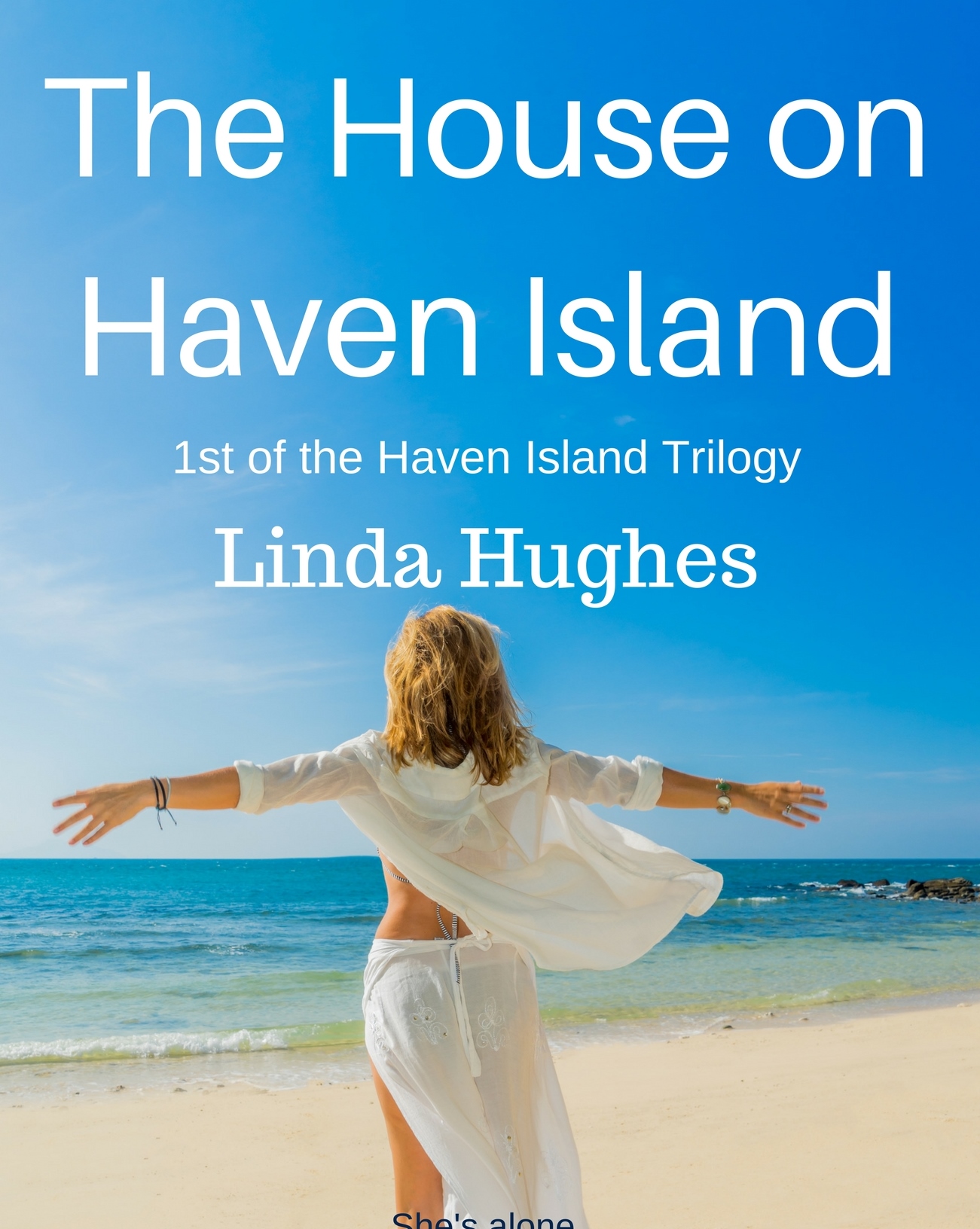
 Every serious writer knows the endless rules to writing a good book. But I’ve always wondered: Who makes up all these rules and why do we slovenly follow them? A lot of them are boring. That’s why I relished writing The House on Haven Island, my first romantic suspense novel, a murder mystery. Rather, an attempted murder. See, I already broke a rule. The murder never actually comes off.
Every serious writer knows the endless rules to writing a good book. But I’ve always wondered: Who makes up all these rules and why do we slovenly follow them? A lot of them are boring. That’s why I relished writing The House on Haven Island, my first romantic suspense novel, a murder mystery. Rather, an attempted murder. See, I already broke a rule. The murder never actually comes off.
Anyway, because I knew I would publish this myself on Kindle and would not, therefore, be beholdin’ to an editor or publisher, I did anything I damn well pleased. What fun!
Here are some of the rules that were so happily broken:
- Every chapter should be about the same length, traditionally 20-25 pages. Phooey. I told a story until it was done, and that was the end of the chapter. No benign filler. Some chapters are twenty pages and some are three. So sue me.
- Don’t end a sentence in a preposition. I did so whenever I wanted to. So there. After all, that’s how we talk. That rule doesn’t make sense anyway. It’s based on Latin rules of grammar and English is a Germanic language. I’m pretty sure my German ancestors don’t care what we use a preposition for.
- Ladies don’t swear. Ha! The truth is, and women know this, females are capable of swearing like sailors on steroids. We just don’t do it in public as often as men. My main character, Lila, is alone on an island with no memory. Do you really think she wouldn’t cuss up a storm? “Oh, my gosh! I’m in such doll-garn trouble. Golly gee whiz, what am I going to do?” Not a chance. Note the title of this blog to solidify my point.
- One pre-reader said Lila talks to the chimpanzees, at first the only other living beings on the island, too much. I consulted with my trusty advisers, my dogs LuLu and Lucky, and my cat Lucy. “Do I talk to animals too much?” I asked. They all agreed: “Of course not!” My conversations with them directed the ones in the book. By the way, I also talk to plants and trees.
- Women don’t seduce men; the man always seduces the woman. If you believe that, you need to get a grip on reality. My protagonist Lila seduces the man of her desire. Believe me, he doesn’t complain.
- People meet and fall in love but don’t consummate their relationship until near the end of the book. That’s no fun. It was a lot more interesting to have the sexy scenes start early on and carry on throughout the book. This book is hot!
- A book has to be traditionally published to be legitimate. Nope. This is a great read.
Because The House on Haven Island isn’t conventional, I know it isn’t for everybody. I also know I have a lot of unconventional readers and friends who will love it. I know I do. I hope you do, too. Join Lila as she gets lost in a seductive tropical world of mystery and love. Get lost in your own dreamy world along the way.
The Day I Met Carrie Fisher

Many years ago I was doing a community building workshop for Toyota at a conference they held for their female employees. There were thousands of women there. One of the keynote speakers was Carrie Fisher. I thought her speech was fantastic. A bit wacky, a lot funny, and very touching, she talked about her life, including how odd it had been to become a Pez dispenser at age 19.
I didn’t expect to meet her close up and personal, but as I was leaving the hotel the next day I stood outside waiting for the taxi the doorman had called for me. Lo and behold, there was Carrie, sitting on a low brick wall, waiting for her limo to arrive. We were the only two people out there. She immediately struck up a conversation, so I sat down beside her to chat.
She asked what I’d been doing there and when she found out I have a degree in counseling, she wanted to know if I thought her family life was odd. She candidly revealed that she’d had a complicated relationship with her mother. Now that she was a mother herself, she appreciated what her mom had gone through to raise her, especially most often as a single mom. Her own mother, the incomparable Debbie Reynolds, had been off making movies a lot when Carrie was young and, being such a huge talent, was a hard act to follow. However, at this point in her life, Carrie appreciated her mom and said she was the best grandmother in the world. She was so grateful they lived next door to each other. When Carrie went off the deep end, which she confessed to doing pretty regularly, her mother was always there to take care of her granddaughter, Carrie’s daughter.
Carrie wanted to know if I thought that was weird. She thought maybe it was, but hadn’t quite figured it out yet. I told her I thought it was perfectly normal to do what’s best for one’s child. She smiled broadly when I said “perfectly normal.”
Her limo came and seeing that we were both going to the airport and that we’d just had such a spontaneously intimate conversation, I felt certain she’d invite me to ride with her. Instead, she got in, waved, and rode off.
Ah, that was Carrie Fisher. Candid. Funny. Real. Alive. Unapologetic. It was a privilege to have met her. I’ve never forgotten our talk, or that beautiful smile.
5 Reasons You Should Attend Your 50th High School Reunion
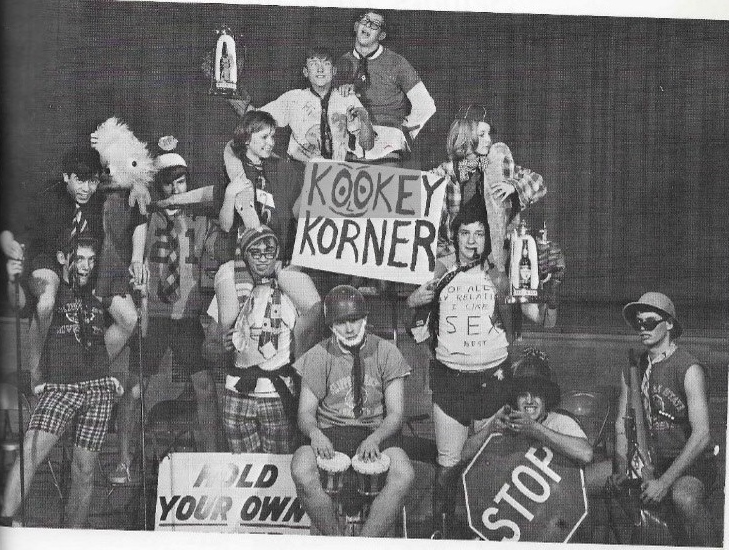
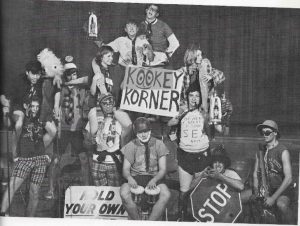 I almost didn’t go. After all, until her death twelve years ago, my mom kept me up on all the hometown gossip about people I knew (and didn’t know). West Branch, Michigan, has about 2,000 people and my class at West Branch High School graduated 105 kids in 1966. I figured I’d kept in touch with a few of my closest friends, so what would be the point of traveling a thousand miles from my home in Braselton, Georgia, to see a bunch of old folks I hardly remember?
I almost didn’t go. After all, until her death twelve years ago, my mom kept me up on all the hometown gossip about people I knew (and didn’t know). West Branch, Michigan, has about 2,000 people and my class at West Branch High School graduated 105 kids in 1966. I figured I’d kept in touch with a few of my closest friends, so what would be the point of traveling a thousand miles from my home in Braselton, Georgia, to see a bunch of old folks I hardly remember?
But after perusing classmates’ Facebook pages with fun old photos, I decided what the hell I’d go.
I had a blast, which brings me to my list of 5 reasons you, too, should attend your 50th – or 40th or 60th or whatever – high school reunion.
- There is a sense of community amongst classmates. I suppose most classes feel that way, but I was gobsmacked with the sense of camaraderie amongst my classmates. Once I got past the changed faces and physiques, and started remembering people by their voices, I felt like we’d never missed a beat. A number of them and I went from kindergarten to graduation together. There is even one man who was born the same day as me in our hometown hospital and we’ve always known that the nurses switched us, giving each of us to the wrong mother for our first breastfeeding. So he and I have been connected since day one of our lives.
Later on as I reflected upon this feeling of community, I realized that now that many of our parents have passed on, we have no one to share memories of our youth with other than each other. No one else on earth shares our schoolhouse experiences. We can recall the lavender scent of our kindergarten teacher, the jiggle of our third grade teacher’s fat arms, and the joy of shooting off our first rocket in eighth grade. Art class, dance day, playground, cursive, health and safety… Somehow as little kids we navigated the nuances of pending adulthood and survived together.
And when we were young we could never have anticipated the war to come in a land we had yet to ever hear of: Vietnam. Soon after graduation many boys were drafted and went to war. We reminisced about those who never returned. That kind of communal grief would be hard for anyone else to comprehend.
- People get better as they age. If you’d asked my 17-year-old self which of my male classmates would become handsome men, I would have been woefully wrong. What a delightful surprise.
And I thought all of the women were beautiful. Maybe it was just a matter of getting rid of our ‘60s hard hat hairdos, but they were stunning. Fun clothes. Glorious white hair. Pretty skin. Plump, slim, and in-between, they all looked great.
I anticipated as much when we were seniors. I gave the Baccalaureate dinner speech. I have no recollection as to why on earth I was chosen to give that speech – it certainly wasn’t because of good grades – but I do remember being reprimanded afterward. I had said that someday we would come back to our class reunion, curious to see if Rudy still had that wink and Jezebel still had that wiggle. Some of the grown-ups failed to see the humor in that. But I now know I was right. And I still think it’s funny.
- Old wounds really do heal. There was, of course, a lot of typical teenaged angst back in the day. But we couldn’t remember exactly what it was all about. There were jealousies over boyfriends and girlfriends, to be sure, and competitive rivalries over grades and sports, but all of that old animosity has fallen by the wayside in the throes of real life.
Even my neighborhood bully told me she now knows it was wrong of her to blackmail us other kids into paying her to stay out of our yards. Nice admission, although I noticed that she didn’t apologize. I got a kick out of the irony of that.
- Compassion dwells in the hearts of childhood friends. A couple of my classmates have obvious health problems. Rather than pity, however, I saw compassion from others. There was no “poor you,” just concern and caring.
There was also empathy for those who have lost loved ones, especially a child. As one man put it, many of us share the bond of having experienced “the worst day of our lives.”
I suspect by now we’ve all been through so many heartbreaks and disappointments that nothing surprises us. Rather than waste time feeling sorry for anyone else or for ourselves, we get down to the business of taking care of whatever befalls our friends, with as much love and compassion as possible.
- That graduation speech was right. I don’t actually remember the speaker or anything he said, seeing that I was pissed off during the whole ceremony. Because I’d been skipping school a lot anyway, I’d decided to skip graduation, too. But my mom grabbed me by the arm and made me go. Anyway, I’m sure that like most graduation speeches ours was about forging our way into the future with guts and glory. Well, wouldn’t you know, it does take a lot of guts and glory to be an adult. We rose above the milieu of life, matured for the most part, and muddled our way through.
I’m not naïve enough to think that everyone waxes fantastic about our graduating class. But still, we’re a group who is – for better and for worse – forever bonded together. If nothing else, that reunion was a good time with old friends, fun music, tasty food, and delightful beverages. Go to your reunion and let me know what it’s like for you. I’m curious to see if you enjoy it as much as I did. www.lindahughes.com
The Spark

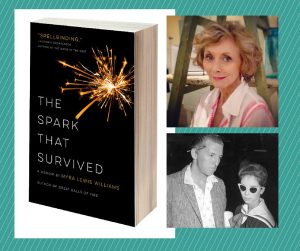
I knew I liked Myra Lewis Williams 27 years ago when we went to lunch together for the first time. We were in a Mexican restaurant enjoying our meal when a cockroach crawled up the wall at her shoulder. Without breaking her stride Myra took off her shoe, smashed it, put her shoe back on, and went back to eating her enchilada.
I knew then that she was my kind of girl. We’ve been friends ever since.
We met when my husband started work for her husband’s real estate agency. She’d been doing a lot of public speaking and because I did, too, in my job as a seminar leader, we figured we’d have a lot in common. We do.
A year later Myra introduced me to Marka Palmer, who she’d met not long before at a conference. She liked Marka a lot, describing her as an all-Southern girl. Again, as soon as we met, it was apparent that the three of us would become best friends. Fast-forward many, many years and us “three amigos” are still so close that we tease that we have to remain friends forever because we all know too much about each other.
As a writer, for years I’d been saying to Myra, “You have to write another memoir! Women need to hear this story!” She’d tell Marka and me stories that made us laugh are butts off, cry like babies, and sit in sheer amazement. I knew her story of survival at the hands of an abusive husband, who she married at age 13, would be an inspiration to any woman who has ever endured abuse.
So last year when the time finally seemed right and she asked if I’d assist her in writing her memoir I was both thrilled and scared. After all, I’ve done a lot of writing and knew this was bound at times to be a grueling task. I didn’t want anything to mar our friendship.
Well, we survived and her book is amazing! The Spark that Survived is a testament to a woman’s ability to make it through life’s worst events. As Myra says, “It’s a book about how to survive life’s worst tragedies and your own dumbass decisions.”
I hope you’ll read this story and share it with others. Somewhere in your life is a woman who could benefit from this story. Maybe even you.
A Rose is a Rose

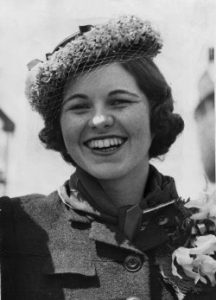 With the two new biographies just out about Rosemary Kennedy, I decided it’s time to share a story about my experience working for her sister, Eunice Kennedy Shriver. Yes, they were sisters in the Kennedy family, thus sisters to JFK, Robert, and Ted. It was 1974 when I volunteered to work at the Special Olympics, which was a new organization with a big event being held on my college campus, Central Michigan University.
With the two new biographies just out about Rosemary Kennedy, I decided it’s time to share a story about my experience working for her sister, Eunice Kennedy Shriver. Yes, they were sisters in the Kennedy family, thus sisters to JFK, Robert, and Ted. It was 1974 when I volunteered to work at the Special Olympics, which was a new organization with a big event being held on my college campus, Central Michigan University.
Mrs. Shriver (I never dared call her Eunice) had founded the Special Olympics out of love for her sister Rosemary. As those of us who worked the three-day event on the track field all knew, Rosemary was what was then called retarded, today called mentally impaired. What we didn’t know at that time and what I learned in subsequent years was that Rosemary’s disability was due to her father having had her lobotomized. It’s a brutal tale for which you’ll have to read the biographies to get details.
But working with Mrs. Shriver was something else. I was a small-town girl in a small-town college with a small-time job. The first time I laid eyes on Mrs. Shriver it was obvious that the silk dress and pearls she wore were more valuable than everything I owned on earth all put together, including my junker of $75 Volkswagen Beetle car. I thought her regal, beautiful, aristocratic… a combination I’d seldom witnessed in my little world. But one thing was clear: her love of the children who were participating in the games. I barely deigned approach her, but the athletes could go to her dirty and sweaty, and hug the heck out of that silk dress and Mrs. Shriver never flinched. They all received her affection.
I fell in love with her. I thought her the most marvelous woman I’d ever met. Today I see her as one of the most influential and important women of the twentieth century for bringing mental impairment out of the closet – literally in too many cases – and bringing human beings with all types of abilities together in a spirit of hope and fun and love.
As luck would have it, my job was to meet celebrities as they arrived and escort them to Mrs. Shriver. It was such fun meeting people I’d seen in the news, including TV and movie stars, athletes, and even Miss America. Out of everyone I met, however, two stood out for their interactions with the kids. Sally Struthers, who was a huge star due to the hit TV show All in the Family, showed up each morning before the kids came. She was there when they arrived and stayed until she’d given every last one of them a hug in the evening. Then she’d go out dancing ’til the wee hours of the morning. I couldn’t even begin to keep up with her. She was great. And singer Mac Davis sat under a tree all day long and taught the kids how to play music with spoons. They loved that. I think we stole every spoon out of the cafeteria in order to handle all the kids who wanted to play. They would go run their meet, then scurry right back to Mac to play more spoons.
There were some celebrities who came just for the photo ops. Once that camera flash popped they were gone.
On the second day Mrs. Shriver’s two children arrived in a limousine. I’m not sure I’d ever seen a limo before that event, so the thought of riding in such a big car was totally foreign to me. When I suggested to Mrs. Shriver’s personal assistant that her children needed some outdoor clothes instead of the proper prep school things they were wearing, he seemed shocked, then considered it. He went to his boss and she looked my way suspiciously. But her assistant eventually came to me with $200 cash and told me to go buy them something more appropriate. I’ll never forget the feel of that cash in my hand. At that time in my life, that was like giving me $2000 in pure gold.
Of course, I didn’t occur to me that they didn’t expect me to take the kids. After all, I’d spent years babysitting others’ children and taking care of my younger siblings, so I was used to being responsible for little ones. And I needed them to try on the clothes. I grabbed Maria, who was about twelve, and her younger brother, who was maybe eight, and we hopped into my $75 Beetle convertible with the broken top and bright plastic flower stickers covering the rips in the seats, and off we went to K-Mart. They loved my car! They’d never seen anything like it. It was the same with K-Mart. They ran up and down the aisles in wonder. It only took a few minutes to get shorts, tee-shirts, and tennis shoes, which they wore with glee. We were back at the track within twenty minutes. When I handed Mrs. Shriver $175 in change she was shocked. She said she hadn’t seen the limo leave and it was then that it became clear to me I didn’t know how things were done in the upper crust.
More and more over the years I’ve come to appreciate how she bravely spoke out about a topic many were embarrassed to acknowledge – the need for services for people with disabilities. I’ve come to understand that she did it out of love for her sister who, according to the recent biographies, she did not know the whereabouts of for many years. When she learned about Rosemary’s fate and that she was sequestered in an institution for the disabled, she visited her beloved sister on a regular basis. It was then that she put her family’s money, privilege, and power to good use to help others with disabilities.
As I said, Eunice Kennedy Shriver was one of the greatest women of the 20th century. We can only hope to have more like her in the 21st.
5 Reasons You Should Write Your Memoir
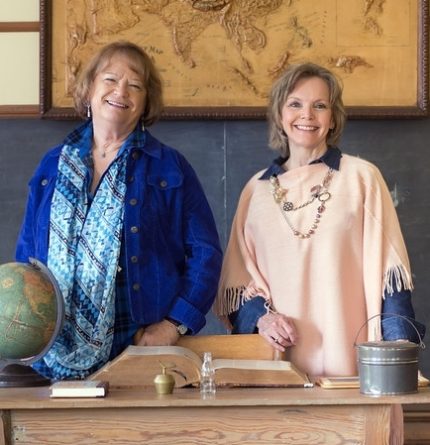
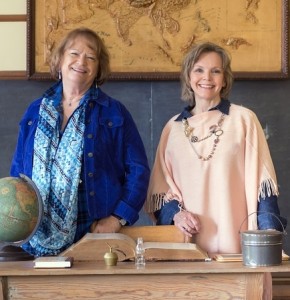 Everybody has a story. What’s yours?
Everybody has a story. What’s yours?
You may think your story isn’t worth telling, but all of us have had disappointments, triumphs, and comedy throughout our lives. Somebody out there is likely to enjoy your tale and to get something out of it, if it’s told in an engaging way. That’s why Katherine Gray White and I have started Mudsill Memoirs writing workshops.
At our live events and in our online classes, we teach that there are five good reasons for penning
your story:
- Preserve your personal, family, and community history.
- Take in the breadth and scope of your life, recapturing lost dreams and desires.
- Honor your life-long traditions through timeless storytelling.
- Give yourself the gift of reflection.
- Have fun and more fun.
Sound good? Click here to learn more about our online writing workshop, Write Your Life Story.
Join us! We’d love to have you there.
